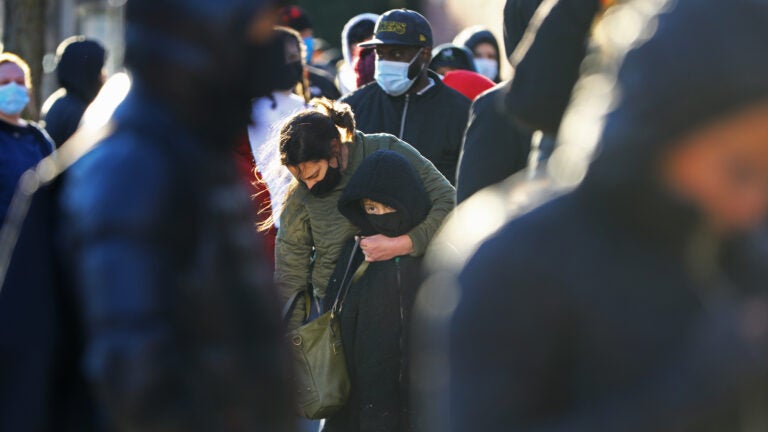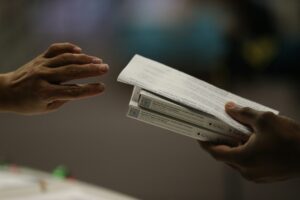Coronavirus
“As pressures to close schools again grow, we should recognize that the patterns of school closures and reopenings last year were defined by racial inequality.”
After two school years disrupted by the COVID-19 pandemic, a Harvard disease expert says remote learning “should be off the table,” even — or perhaps especially — as the omicron variant of COVID-19 drives up local infection rates.
The rapidly spreading variant — on top of the delta-fueled fall surge — has postponed return-to-office plans and sporting events and cancelled shows and parties; it even prompted some universities, including Harvard, to temporarily shift to remote classes.
But according to Joseph Allen, such a move in the K-12 system “would be a tragic mistake.”
“The argument for keeping schools open rests on two constants ever since the Covid pandemic began,” Allen, an associate professor and the director of the Healthy Buildings program at Harvard’s T.H. Chan School of Public Health, wrote in a New York Times opinion piece Monday. “The risk of severe outcomes to kids from coronavirus infection is low, and the risks to kids from being out of school are high.”
Allen noted that the weekly COVID-19 hospitalization rate for school-age children — those between the ages of 5 and 17 — has remained around 1 in 100,000 throughout the pandemic. Additionally, he said there’s “promising” research suggesting that rates of long-term symptoms in kids who tested positive — so-called “long COVID” — aren’t much different from those who didn’t have the disease.
And while it’s still early, Allen said the data from other countries suggest that “kids will remain low risk during the omicron surge as well.”
“The harms to kids from being out of school, on the other hand, are severe,” he wrote. “They are accumulating. And they could last for decades.”
Allen pointed to the estimated learning loss, as well as adverse impacts to mental health and food access, particularly among students of color.
“As pressures to close schools again grow, we should recognize that the patterns of school closures and reopenings last year were defined by racial inequality,” he wrote. “Black and Hispanic students were twice as likely as white students to be remote and were twice as likely to have no live access to a teacher. This disparity persisted into the spring of 2021 as schools reopened: Whereas 2 percent of majority white districts stayed closed, 18 percent of majority Black schools stayed remote, and nearly one in four majority Hispanic schools stayed closed.”
Even in the face of omicron, Allen is hardly alone. Dr. Ashish Jha, the president of Brown University’s School of Public Health, said on MSNBC this week that it would be “irresponsible” for school leaders to shift to remote learning.
“If I hear of a single school district that goes remote, but keeps bars open, that says to me that they don’t care about kids and they don’t care about COVID,” Jha said. “Because bars spread Covid. Schools generally don’t.”
Jha added that “this is not March 2020,” referring to the availability of vaccines and increased testing.
Rather than closures, Allen wrote that school districts should be pursuing vaccination mandates for “all adults in schools and day cares,” while parents should get their kids vaccinated. He also backed the “test and stay” style programs that have been promoted by both Gov. Charlie Baker and President Joe Biden in order to minimize quarantines.
Allen goes further in some cases.
In the absence of tests, he said the “default still should be keeping kids in classrooms, coupled with more aggressive monitoring of symptoms.”
“This is less optimal than test to stay but preferable to sending entire classrooms home,” he wrote.
Allen suggested a change to the mantra that “schools should be the last to close and first to open,” which he suggested “sounded good and was catchy,” but wasn’t expected to be challenged after vaccines were first introduced earlier this year.
“Now that there is an actual threat of schools closing, I’m realizing that this mantra was wrong,” he wrote. “It should simply be, ‘Schools should never close.’”
Newsletter Signup
Stay up to date on all the latest news from Boston.com






